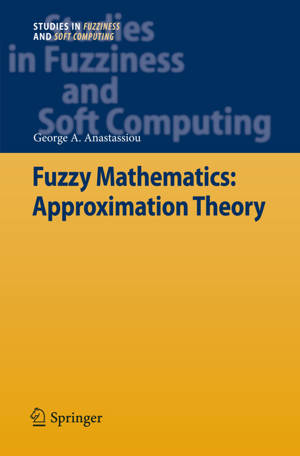
Bedankt voor het vertrouwen het afgelopen jaar! Om jou te bedanken bieden we GRATIS verzending (in België) aan op alles gedurende de hele maand januari.
- Afhalen na 1 uur in een winkel met voorraad
- Gratis thuislevering in België vanaf € 30
- Ruim aanbod met 7 miljoen producten
Bedankt voor het vertrouwen het afgelopen jaar! Om jou te bedanken bieden we GRATIS verzending (in België) aan op alles gedurende de hele maand januari.
- Afhalen na 1 uur in een winkel met voorraad
- Gratis thuislevering in België vanaf € 30
- Ruim aanbod met 7 miljoen producten
Zoeken
Omschrijving
This monograph is the r st in Fuzzy Approximation Theory. It contains mostly the author s research work on fuzziness of the last ten years and relies a lot on [10]-[32] and it is a natural outgrowth of them. It belongs to the broader area of Fuzzy Mathematics. Chapters are self-contained and several advanced courses can be taught out of this book. We provide lots of applications but always within the framework of Fuzzy Mathematics. In each chapter is given background and motivations. A c- plete list of references is provided at the end. The topics covered are very diverse. In Chapter 1 we give an extensive basic background on Fuzziness and Fuzzy Real Analysis, as well a complete description of the book. In the following Chapters 2,3 we cover in deep Fuzzy Di?erentiation and Integ- tion Theory, e.g. we present Fuzzy Taylor Formulae. It follows Chapter 4 on Fuzzy Ostrowski Inequalities. Then in Chapters 5, 6 we present results on classical algebraic and trigonometric polynomial Fuzzy Approximation.
Specificaties
Betrokkenen
- Auteur(s):
- Uitgeverij:
Inhoud
- Aantal bladzijden:
- 444
- Taal:
- Engels
- Reeks:
- Reeksnummer:
- nr. 251
Eigenschappen
- Productcode (EAN):
- 9783642262395
- Verschijningsdatum:
- 4/05/2012
- Uitvoering:
- Paperback
- Formaat:
- Trade paperback (VS)
- Afmetingen:
- 155 mm x 229 mm
- Gewicht:
- 635 g

Alleen bij Standaard Boekhandel
+ 518 punten op je klantenkaart van Standaard Boekhandel
Beoordelingen
We publiceren alleen reviews die voldoen aan de voorwaarden voor reviews. Bekijk onze voorwaarden voor reviews.









